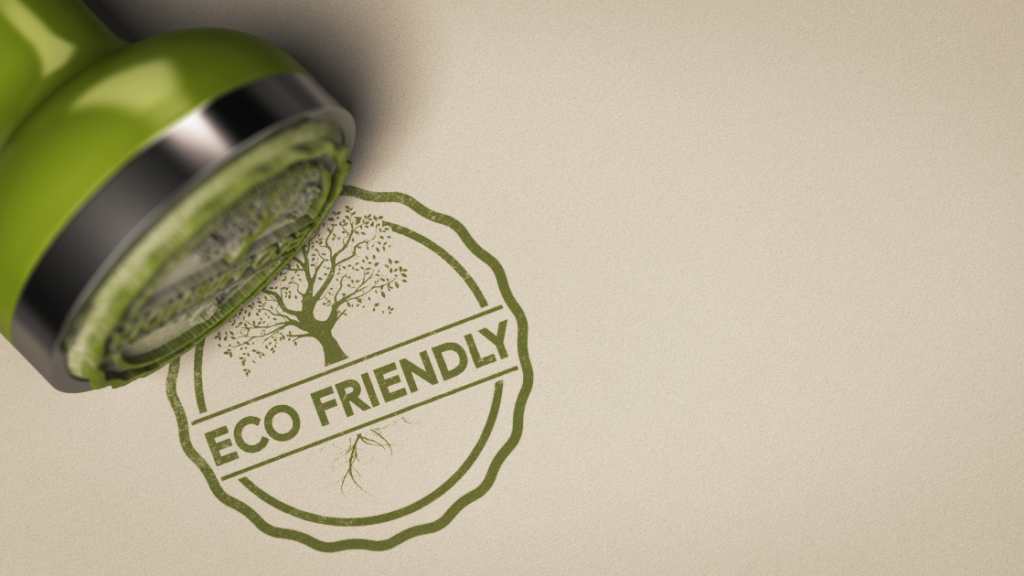Sustainability is a growing concern in the events, meetings & conferences industry and for a good reason. According to various reports, the average conference attendee generates 1.89kg of discarded waste. And over 170kg of carbon emissions daily. When you scale that up, things get pretty surprising! For 1,000 attendees, it can generate up to 5670kg of waste. Over half of which will end up directly in the landfill. With at least thousands of events occurring yearly, this waste and carbon emissions quickly add up and significantly impact the environment. However, there are ways to reduce this impact and make events more sustainable.
Sustainability is no longer a buzzword but a necessity for businesses, including those in the events industry. As Neil explained in our podcast, sustainability in branding goes beyond just reducing waste It’s about creating a purpose and a positive impact on both social and environmental fronts.
Durability is about creating equipment that can withstand the wear and tear of regular use. Event planners can reduce the waste generated by events by creating durable equipment. Additionally, durable equipment reduces the need for new equipment for every event, in which we can use multiple times.
Longevity is about creating equipment that has a long lifespan. Event organisers should consider the lifespan of their equipment and choose materials that can withstand the test of time. By investing in equipment with a long lifespan, event organisers can reduce the amount of waste generated by events and save money in the long run.
Reusability is about creating equipment which we can reuse multiple times. By creating reusable equipment, event organisers can reduce the amount of waste generated by events and save money by not having to purchase new equipment for every event.
The circular economy is a concept that focuses on creating a closed-loop system to keep waste at its lowest, and by using materials as much as possible. We can apply this concept during the event planning by creating a system where equipment and materials are reused, repaired, or repurposed.
Expandabrand commitment to sustainability and the company’s work with Uzwelo project and Bateleurs, a South African Non-Profit Company that uses private aircraft for aerial surveillance to relocate animals around Africa and protect wildlife. This an example of the circular economy in action. Expandabrand positively impacts the environment and communities by repurposing waste fabric and supporting Bateleurs.
[{"id":6849,"link":"https:\/\/roostertailsport.com\/2025\/01\/30\/sports-business-trends-2025-the-new-playbook-for-success\/","name":"sports-business-trends-2025-the-new-playbook-for-success","thumbnail":{"url":"https:\/\/roostertailsport.com\/wp-content\/uploads\/2025\/01\/DALL\u00b7E-2025-01-30-09.54.37-A-realistic-wide-size-digital-artwork-representing-key-topics-from-a-sports-business-blog.-The-image-includes_-1-A-person-holding-a-smartphone-stream.webp","alt":"Wide collage featuring a smartphone streaming soccer, a basketball player in action, an American football player, a Formula 1 car, and blockchain elements."},"title":"Sports Business Trends 2025: The New Playbook for Success","author":{"name":"Sid Bensalah","link":"https:\/\/roostertailsport.com\/author\/sid\/"},"date":"Jan 30, 2025","dateGMT":"2025-01-30 08:56:15","modifiedDate":"2025-01-30 10:22:44","modifiedDateGMT":"2025-01-30 09:22:44","commentCount":"0","commentStatus":"closed","categories":{"coma":"<a href=\"https:\/\/roostertailsport.com\/category\/sports-business\/\" rel=\"category tag\">Sports Business<\/a>","space":"<a href=\"https:\/\/roostertailsport.com\/category\/sports-business\/\" rel=\"category tag\">Sports Business<\/a>"},"taxonomies":{"post_tag":"<a href='https:\/\/roostertailsport.com\/tag\/caitlain-clark\/' rel='post_tag'>Caitlain Clark<\/a><a href='https:\/\/roostertailsport.com\/tag\/cryptocurrency\/' rel='post_tag'>Cryptocurrency<\/a><a href='https:\/\/roostertailsport.com\/tag\/formula1\/' rel='post_tag'>Formula1<\/a><a href='https:\/\/roostertailsport.com\/tag\/golf\/' rel='post_tag'>Golf<\/a><a href='https:\/\/roostertailsport.com\/tag\/innovation\/' rel='post_tag'>Innovation<\/a><a href='https:\/\/roostertailsport.com\/tag\/lionel-messi\/' rel='post_tag'>Lionel Messi<\/a><a href='https:\/\/roostertailsport.com\/tag\/liv\/' rel='post_tag'>LIV<\/a><a href='https:\/\/roostertailsport.com\/tag\/motorsports\/' rel='post_tag'>Motorsports<\/a><a href='https:\/\/roostertailsport.com\/tag\/nba\/' rel='post_tag'>NBA<\/a><a href='https:\/\/roostertailsport.com\/tag\/nft\/' rel='post_tag'>NFT<\/a><a href='https:\/\/roostertailsport.com\/tag\/pga\/' rel='post_tag'>PGA<\/a><a href='https:\/\/roostertailsport.com\/tag\/podcasts\/' rel='post_tag'>Podcasts<\/a><a href='https:\/\/roostertailsport.com\/tag\/simone-biles\/' rel='post_tag'>Simone Biles<\/a><a href='https:\/\/roostertailsport.com\/tag\/sports-broadcasting\/' rel='post_tag'>Sports Broadcasting<\/a><a href='https:\/\/roostertailsport.com\/tag\/sports-podcasts\/' rel='post_tag'>Sports Podcasts<\/a><a href='https:\/\/roostertailsport.com\/tag\/streaming\/' rel='post_tag'>Streaming<\/a><a href='https:\/\/roostertailsport.com\/tag\/technology\/' rel='post_tag'>Technology<\/a><a href='https:\/\/roostertailsport.com\/tag\/web3\/' rel='post_tag'>Web3<\/a>"},"readTime":{"min":4,"sec":6},"status":"publish","excerpt":""},{"id":6808,"link":"https:\/\/roostertailsport.com\/2024\/10\/13\/the-environmental-cost-of-sports-more-than-just-a-game\/","name":"the-environmental-cost-of-sports-more-than-just-a-game","thumbnail":{"url":"https:\/\/roostertailsport.com\/wp-content\/uploads\/2024\/10\/46.png","alt":"Ariel views a packed sports stadium surrounded by urban development and smog."},"title":"The Environmental Cost of Sports: More Than Just a Game","author":{"name":"Sid Bensalah","link":"https:\/\/roostertailsport.com\/author\/sid\/"},"date":"Oct 13, 2024","dateGMT":"2024-10-13 11:28:26","modifiedDate":"2024-10-13 12:28:31","modifiedDateGMT":"2024-10-13 11:28:31","commentCount":"0","commentStatus":"closed","categories":{"coma":"<a href=\"https:\/\/roostertailsport.com\/category\/uncategorized\/\" rel=\"category tag\">Uncategorized<\/a>","space":"<a href=\"https:\/\/roostertailsport.com\/category\/uncategorized\/\" rel=\"category tag\">Uncategorized<\/a>"},"taxonomies":{"post_tag":""},"readTime":{"min":7,"sec":29},"status":"publish","excerpt":""},{"id":6801,"link":"https:\/\/roostertailsport.com\/2024\/10\/07\/why-japanese-brands-are-leaving-olympic-ponsorships\/","name":"why-japanese-brands-are-leaving-olympic-ponsorships","thumbnail":{"url":"https:\/\/roostertailsport.com\/wp-content\/uploads\/2024\/10\/pexels-photo-236937-236937.jpg","alt":"Olympic Symbol Landmark"},"title":"Why Japanese Brands Are Leaving Olympic Sponsorships?","author":{"name":"Sid Bensalah","link":"https:\/\/roostertailsport.com\/author\/sid\/"},"date":"Oct 7, 2024","dateGMT":"2024-10-07 08:43:49","modifiedDate":"2024-10-13 10:17:01","modifiedDateGMT":"2024-10-13 09:17:01","commentCount":"0","commentStatus":"closed","categories":{"coma":"<a href=\"https:\/\/roostertailsport.com\/category\/uncategorized\/\" rel=\"category tag\">Uncategorized<\/a>","space":"<a href=\"https:\/\/roostertailsport.com\/category\/uncategorized\/\" rel=\"category tag\">Uncategorized<\/a>"},"taxonomies":{"post_tag":""},"readTime":{"min":4,"sec":17},"status":"publish","excerpt":""},{"id":6788,"link":"https:\/\/roostertailsport.com\/2024\/04\/08\/in-conversation-with-sailgp-racing-towards-sustainable-future\/","name":"in-conversation-with-sailgp-racing-towards-sustainable-future","thumbnail":{"url":"https:\/\/roostertailsport.com\/wp-content\/uploads\/2024\/07\/03A_RP4_5485-1.png","alt":"In Conversation with SailGP: Racing Towards a Sustainable Future"},"title":"In Conversation with SailGP: Racing Towards a Sustainable Future","author":{"name":"Sid Bensalah","link":"https:\/\/roostertailsport.com\/author\/sid\/"},"date":"Apr 8, 2024","dateGMT":"2024-04-08 07:25:00","modifiedDate":"2024-07-11 09:26:22","modifiedDateGMT":"2024-07-11 08:26:22","commentCount":"0","commentStatus":"closed","categories":{"coma":"<a href=\"https:\/\/roostertailsport.com\/category\/uncategorized\/\" rel=\"category tag\">Uncategorized<\/a>","space":"<a href=\"https:\/\/roostertailsport.com\/category\/uncategorized\/\" rel=\"category tag\">Uncategorized<\/a>"},"taxonomies":{"post_tag":""},"readTime":{"min":4,"sec":20},"status":"publish","excerpt":""},{"id":6707,"link":"https:\/\/roostertailsport.com\/2024\/03\/07\/biodiversity-preservation-a-conversation-with-vikram-krishna\/","name":"biodiversity-preservation-a-conversation-with-vikram-krishna","thumbnail":{"url":"https:\/\/roostertailsport.com\/wp-content\/uploads\/2024\/03\/Preserving-Biodiversity.-A-Conversation-with-Vikram-Krishna-of-Sacred-Groves.jpg","alt":"Preserving Biodiversity: A Conversation with Vikram Krishna of Sacred Groves"},"title":"Biodiversity Preservation: A Conversation with Vikram Krishna.","author":{"name":"Sid Bensalah","link":"https:\/\/roostertailsport.com\/author\/sid\/"},"date":"Mar 7, 2024","dateGMT":"2024-03-07 17:02:14","modifiedDate":"2024-03-08 17:21:07","modifiedDateGMT":"2024-03-08 16:21:07","commentCount":"0","commentStatus":"closed","categories":{"coma":"<a href=\"https:\/\/roostertailsport.com\/category\/biodiversity\/\" rel=\"category tag\">Biodiversity<\/a>, <a href=\"https:\/\/roostertailsport.com\/category\/conservation\/\" rel=\"category tag\">Conservation<\/a>, <a href=\"https:\/\/roostertailsport.com\/category\/sustainability\/\" rel=\"category tag\">Sustainability<\/a>","space":"<a href=\"https:\/\/roostertailsport.com\/category\/biodiversity\/\" rel=\"category tag\">Biodiversity<\/a> <a href=\"https:\/\/roostertailsport.com\/category\/conservation\/\" rel=\"category tag\">Conservation<\/a> <a href=\"https:\/\/roostertailsport.com\/category\/sustainability\/\" rel=\"category tag\">Sustainability<\/a>"},"taxonomies":{"post_tag":"<a href='https:\/\/roostertailsport.com\/tag\/biodiversity\/' rel='post_tag'>Biodiversity<\/a><a href='https:\/\/roostertailsport.com\/tag\/conservation\/' rel='post_tag'>Conservation<\/a><a href='https:\/\/roostertailsport.com\/tag\/environmental-impact\/' rel='post_tag'>Environmental Impact<\/a><a href='https:\/\/roostertailsport.com\/tag\/nature-conservation\/' rel='post_tag'>Nature Conservation<\/a><a href='https:\/\/roostertailsport.com\/tag\/pre-zero-sports-talk\/' rel='post_tag'>Pre-Zero Sports Talk<\/a><a href='https:\/\/roostertailsport.com\/tag\/sports-industry\/' rel='post_tag'>Sports Industry<\/a><a href='https:\/\/roostertailsport.com\/tag\/sustainable-sports\/' rel='post_tag'>Sustainable Sports<\/a>"},"readTime":{"min":7,"sec":4},"status":"publish","excerpt":""},{"id":6680,"link":"https:\/\/roostertailsport.com\/2024\/03\/06\/strawberry-hotels-pioneering-sustainable-hospitality\/","name":"strawberry-hotels-pioneering-sustainable-hospitality","thumbnail":{"url":"https:\/\/roostertailsport.com\/wp-content\/uploads\/2024\/03\/Stockholm-City.png","alt":"Strawberry Hotels - Pioneering Sustainability in the Hospitality Landscape."},"title":"Strawberry Hotels: Pioneering Sustainable Hospitality.","author":{"name":"Sid Bensalah","link":"https:\/\/roostertailsport.com\/author\/sid\/"},"date":"Mar 6, 2024","dateGMT":"2024-03-06 18:21:17","modifiedDate":"2024-03-09 10:27:06","modifiedDateGMT":"2024-03-09 09:27:06","commentCount":"0","commentStatus":"closed","categories":{"coma":"<a href=\"https:\/\/roostertailsport.com\/category\/hospitality-industry\/\" rel=\"category tag\">Hospitality Industry<\/a>, <a href=\"https:\/\/roostertailsport.com\/category\/sustainability\/\" rel=\"category tag\">Sustainability<\/a>","space":"<a href=\"https:\/\/roostertailsport.com\/category\/hospitality-industry\/\" rel=\"category tag\">Hospitality Industry<\/a> <a href=\"https:\/\/roostertailsport.com\/category\/sustainability\/\" rel=\"category tag\">Sustainability<\/a>"},"taxonomies":{"post_tag":"<a href='https:\/\/roostertailsport.com\/tag\/climate-change\/' rel='post_tag'>Climate Change<\/a><a href='https:\/\/roostertailsport.com\/tag\/community\/' rel='post_tag'>Community<\/a><a href='https:\/\/roostertailsport.com\/tag\/hospitality-industry\/' rel='post_tag'>Hospitality Industry<\/a><a href='https:\/\/roostertailsport.com\/tag\/hotels\/' rel='post_tag'>Hotels<\/a><a href='https:\/\/roostertailsport.com\/tag\/impact\/' rel='post_tag'>Impact<\/a><a href='https:\/\/roostertailsport.com\/tag\/sports-industry\/' rel='post_tag'>Sports Industry<\/a><a href='https:\/\/roostertailsport.com\/tag\/sustainable-hospitality\/' rel='post_tag'>Sustainable Hospitality<\/a><a href='https:\/\/roostertailsport.com\/tag\/travel\/' rel='post_tag'>Travel<\/a>"},"readTime":{"min":7,"sec":11},"status":"publish","excerpt":""},{"id":6602,"link":"https:\/\/roostertailsport.com\/2024\/01\/14\/sports-business-trends-2024-peak-valuations\/","name":"sports-business-trends-2024-peak-valuations","thumbnail":{"url":"https:\/\/roostertailsport.com\/wp-content\/uploads\/2024\/01\/Sports-Business-Trends-2024.png","alt":"Unconventional sports league challenges established PGA norms."},"title":"Sports Business Trends 2024","author":{"name":"Sid Bensalah","link":"https:\/\/roostertailsport.com\/author\/sid\/"},"date":"Jan 14, 2024","dateGMT":"2024-01-14 19:33:32","modifiedDate":"2024-02-15 10:03:28","modifiedDateGMT":"2024-02-15 09:03:28","commentCount":"0","commentStatus":"closed","categories":{"coma":"<a href=\"https:\/\/roostertailsport.com\/category\/sports-business\/\" rel=\"category tag\">Sports Business<\/a>, <a href=\"https:\/\/roostertailsport.com\/category\/sustainability\/\" rel=\"category tag\">Sustainability<\/a>, <a href=\"https:\/\/roostertailsport.com\/category\/technology\/\" rel=\"category tag\">Technology<\/a>","space":"<a href=\"https:\/\/roostertailsport.com\/category\/sports-business\/\" rel=\"category tag\">Sports Business<\/a> <a href=\"https:\/\/roostertailsport.com\/category\/sustainability\/\" rel=\"category tag\">Sustainability<\/a> <a href=\"https:\/\/roostertailsport.com\/category\/technology\/\" rel=\"category tag\">Technology<\/a>"},"taxonomies":{"post_tag":""},"readTime":{"min":7,"sec":48},"status":"publish","excerpt":""},{"id":6555,"link":"https:\/\/roostertailsport.com\/2023\/12\/18\/cop28-navigating-the-fossil-fuel-exodus\/","name":"cop28-navigating-the-fossil-fuel-exodus","thumbnail":{"url":"https:\/\/roostertailsport.com\/wp-content\/uploads\/2023\/12\/UN-COP28-Dubai-UAE-.png","alt":"UN COP28 Dubai"},"title":"COP28: Navigating the Fossil Fuel Exodus","author":{"name":"Sid Bensalah","link":"https:\/\/roostertailsport.com\/author\/sid\/"},"date":"Dec 18, 2023","dateGMT":"2023-12-18 20:16:04","modifiedDate":"2023-12-19 13:37:43","modifiedDateGMT":"2023-12-19 12:37:43","commentCount":"0","commentStatus":"closed","categories":{"coma":"<a href=\"https:\/\/roostertailsport.com\/category\/environment\/\" rel=\"category tag\">Environment<\/a>, <a href=\"https:\/\/roostertailsport.com\/category\/sustainability\/\" rel=\"category tag\">Sustainability<\/a>, <a href=\"https:\/\/roostertailsport.com\/category\/united-nations-climate-change\/\" rel=\"category tag\">United Nations Climate Change<\/a>","space":"<a href=\"https:\/\/roostertailsport.com\/category\/environment\/\" rel=\"category tag\">Environment<\/a> <a href=\"https:\/\/roostertailsport.com\/category\/sustainability\/\" rel=\"category tag\">Sustainability<\/a> <a href=\"https:\/\/roostertailsport.com\/category\/united-nations-climate-change\/\" rel=\"category tag\">United Nations Climate Change<\/a>"},"taxonomies":{"post_tag":"<a href='https:\/\/roostertailsport.com\/tag\/climateaction\/' rel='post_tag'>#ClimateAction<\/a><a href='https:\/\/roostertailsport.com\/tag\/cop28\/' rel='post_tag'>#COP28<\/a><a href='https:\/\/roostertailsport.com\/tag\/netzero-2\/' rel='post_tag'>#NetZero<\/a><a href='https:\/\/roostertailsport.com\/tag\/sustainability-2\/' rel='post_tag'>#Sustainability<\/a>"},"readTime":{"min":6,"sec":36},"status":"publish","excerpt":""},{"id":6522,"link":"https:\/\/roostertailsport.com\/2023\/09\/06\/athletes-equity-players-sports-business\/","name":"athletes-equity-players-sports-business","thumbnail":{"url":"https:\/\/roostertailsport.com\/wp-content\/uploads\/2023\/09\/The-Business-of-Sports-Where-Strategy-Meets-the-Pitch.png","alt":"Celebrating the Intersection of Sports and Business"},"title":"The Messi Effect: How Athletes Are Becoming Equity Players.","author":{"name":"Sid Bensalah","link":"https:\/\/roostertailsport.com\/author\/sid\/"},"date":"Sep 6, 2023","dateGMT":"2023-09-06 11:35:50","modifiedDate":"2023-09-06 13:36:38","modifiedDateGMT":"2023-09-06 12:36:38","commentCount":"0","commentStatus":"closed","categories":{"coma":"<a href=\"https:\/\/roostertailsport.com\/category\/athlete-influence\/\" rel=\"category tag\">Athlete Influence<\/a>, <a href=\"https:\/\/roostertailsport.com\/category\/entrepreneurship\/\" rel=\"category tag\">Entrepreneurship<\/a>, <a href=\"https:\/\/roostertailsport.com\/category\/sports-business\/\" rel=\"category tag\">Sports Business<\/a>","space":"<a href=\"https:\/\/roostertailsport.com\/category\/athlete-influence\/\" rel=\"category tag\">Athlete Influence<\/a> <a href=\"https:\/\/roostertailsport.com\/category\/entrepreneurship\/\" rel=\"category tag\">Entrepreneurship<\/a> <a href=\"https:\/\/roostertailsport.com\/category\/sports-business\/\" rel=\"category tag\">Sports Business<\/a>"},"taxonomies":{"post_tag":"<a href='https:\/\/roostertailsport.com\/tag\/content-creator\/' rel='post_tag'>content creator<\/a><a href='https:\/\/roostertailsport.com\/tag\/equity-player\/' rel='post_tag'>Equity Player<\/a><a href='https:\/\/roostertailsport.com\/tag\/messi-effect\/' rel='post_tag'>Messi Effect<\/a><a href='https:\/\/roostertailsport.com\/tag\/social-media\/' rel='post_tag'>Social Media<\/a><a href='https:\/\/roostertailsport.com\/tag\/stakeholder\/' rel='post_tag'>stakeholder<\/a>"},"readTime":{"min":8,"sec":30},"status":"publish","excerpt":""},{"id":6492,"link":"https:\/\/roostertailsport.com\/2023\/08\/29\/empowering-change-through-sustainable-activewear\/","name":"empowering-change-through-sustainable-activewear","thumbnail":{"url":"https:\/\/roostertailsport.com\/wp-content\/uploads\/2023\/08\/franziska-Mesche-Tripulse-founder-CEO-1.jpg","alt":"Franziska Mesche, Founder and CEO of Tripulse, showcasing Sustainable Activewear."},"title":"Empowering Change Through Sustainable Activewear.","author":{"name":"Sid Bensalah","link":"https:\/\/roostertailsport.com\/author\/sid\/"},"date":"Aug 29, 2023","dateGMT":"2023-08-29 07:00:59","modifiedDate":"2024-03-07 08:01:43","modifiedDateGMT":"2024-03-07 07:01:43","commentCount":"0","commentStatus":"open","categories":{"coma":"<a href=\"https:\/\/roostertailsport.com\/category\/environment\/\" rel=\"category tag\">Environment<\/a>, <a href=\"https:\/\/roostertailsport.com\/category\/sport-technology\/\" rel=\"category tag\">Sport & Technology<\/a>, <a href=\"https:\/\/roostertailsport.com\/category\/sustainability\/\" rel=\"category tag\">Sustainability<\/a>, <a href=\"https:\/\/roostertailsport.com\/category\/sustainable-fashion\/\" rel=\"category tag\">Sustainable Fashion<\/a>","space":"<a href=\"https:\/\/roostertailsport.com\/category\/environment\/\" rel=\"category tag\">Environment<\/a> <a href=\"https:\/\/roostertailsport.com\/category\/sport-technology\/\" rel=\"category tag\">Sport & Technology<\/a> <a href=\"https:\/\/roostertailsport.com\/category\/sustainability\/\" rel=\"category tag\">Sustainability<\/a> <a href=\"https:\/\/roostertailsport.com\/category\/sustainable-fashion\/\" rel=\"category tag\">Sustainable Fashion<\/a>"},"taxonomies":{"post_tag":"<a href='https:\/\/roostertailsport.com\/tag\/activewear-innovation\/' rel='post_tag'>Activewear Innovation<\/a>"},"readTime":{"min":4,"sec":11},"status":"publish","excerpt":""},{"id":6348,"link":"https:\/\/roostertailsport.com\/2023\/08\/02\/fih-driving-sustainable-change-in-hockey\/","name":"fih-driving-sustainable-change-in-hockey","thumbnail":{"url":"https:\/\/roostertailsport.com\/wp-content\/uploads\/2023\/08\/Hockey-Sport-Action-on-the-turf-womens-game.png","alt":"Women's Hockey Sport in Action: Exciting moments on the turf!"},"title":"FIH: Driving Sustainable Change in Hockey.","author":{"name":"Sid Bensalah","link":"https:\/\/roostertailsport.com\/author\/sid\/"},"date":"Aug 2, 2023","dateGMT":"2023-08-02 14:57:59","modifiedDate":"2023-08-02 16:22:07","modifiedDateGMT":"2023-08-02 15:22:07","commentCount":"0","commentStatus":"closed","categories":{"coma":"<a href=\"https:\/\/roostertailsport.com\/category\/environment\/\" rel=\"category tag\">Environment<\/a>, <a href=\"https:\/\/roostertailsport.com\/category\/olympics\/\" rel=\"category tag\">Olympics<\/a>, <a href=\"https:\/\/roostertailsport.com\/category\/sports-governance\/\" rel=\"category tag\">Sports Governance<\/a>, <a href=\"https:\/\/roostertailsport.com\/category\/sustainability\/\" rel=\"category tag\">Sustainability<\/a>","space":"<a href=\"https:\/\/roostertailsport.com\/category\/environment\/\" rel=\"category tag\">Environment<\/a> <a href=\"https:\/\/roostertailsport.com\/category\/olympics\/\" rel=\"category tag\">Olympics<\/a> <a href=\"https:\/\/roostertailsport.com\/category\/sports-governance\/\" rel=\"category tag\">Sports Governance<\/a> <a href=\"https:\/\/roostertailsport.com\/category\/sustainability\/\" rel=\"category tag\">Sustainability<\/a>"},"taxonomies":{"post_tag":""},"readTime":{"min":3,"sec":32},"status":"publish","excerpt":""},{"id":6302,"link":"https:\/\/roostertailsport.com\/2023\/06\/10\/climate-change-athlete-activism-sports-sustainability\/","name":"climate-change-athlete-activism-sports-sustainability","thumbnail":{"url":"https:\/\/roostertailsport.com\/wp-content\/uploads\/2023\/06\/Climate-Change-Image-by-Gerd-Altmann-from-Pixabay.jpg","alt":"The Impact of Climate Change on Sports and Athlete Activism for Sustainability."},"title":"Climate Change & Athlete Activism: Sports Sustainability.","author":{"name":"Sid Bensalah","link":"https:\/\/roostertailsport.com\/author\/sid\/"},"date":"Jun 10, 2023","dateGMT":"2023-06-10 16:11:58","modifiedDate":"2023-08-11 07:30:15","modifiedDateGMT":"2023-08-11 06:30:15","commentCount":"0","commentStatus":"closed","categories":{"coma":"<a href=\"https:\/\/roostertailsport.com\/category\/athlete-advocacy\/\" rel=\"category tag\">Athlete Advocacy<\/a>, <a href=\"https:\/\/roostertailsport.com\/category\/coaching\/\" rel=\"category tag\">Coaching<\/a>, <a href=\"https:\/\/roostertailsport.com\/category\/environment\/\" rel=\"category tag\">Environment<\/a>, <a href=\"https:\/\/roostertailsport.com\/category\/olympics\/\" rel=\"category tag\">Olympics<\/a>, <a href=\"https:\/\/roostertailsport.com\/category\/sustainability\/\" rel=\"category tag\">Sustainability<\/a>, <a href=\"https:\/\/roostertailsport.com\/category\/winter-sports\/\" rel=\"category tag\">Winter Sports<\/a>","space":"<a href=\"https:\/\/roostertailsport.com\/category\/athlete-advocacy\/\" rel=\"category tag\">Athlete Advocacy<\/a> <a href=\"https:\/\/roostertailsport.com\/category\/coaching\/\" rel=\"category tag\">Coaching<\/a> <a href=\"https:\/\/roostertailsport.com\/category\/environment\/\" rel=\"category tag\">Environment<\/a> <a href=\"https:\/\/roostertailsport.com\/category\/olympics\/\" rel=\"category tag\">Olympics<\/a> <a href=\"https:\/\/roostertailsport.com\/category\/sustainability\/\" rel=\"category tag\">Sustainability<\/a> <a href=\"https:\/\/roostertailsport.com\/category\/winter-sports\/\" rel=\"category tag\">Winter Sports<\/a>"},"taxonomies":{"post_tag":""},"readTime":{"min":6,"sec":15},"status":"publish","excerpt":""}]

